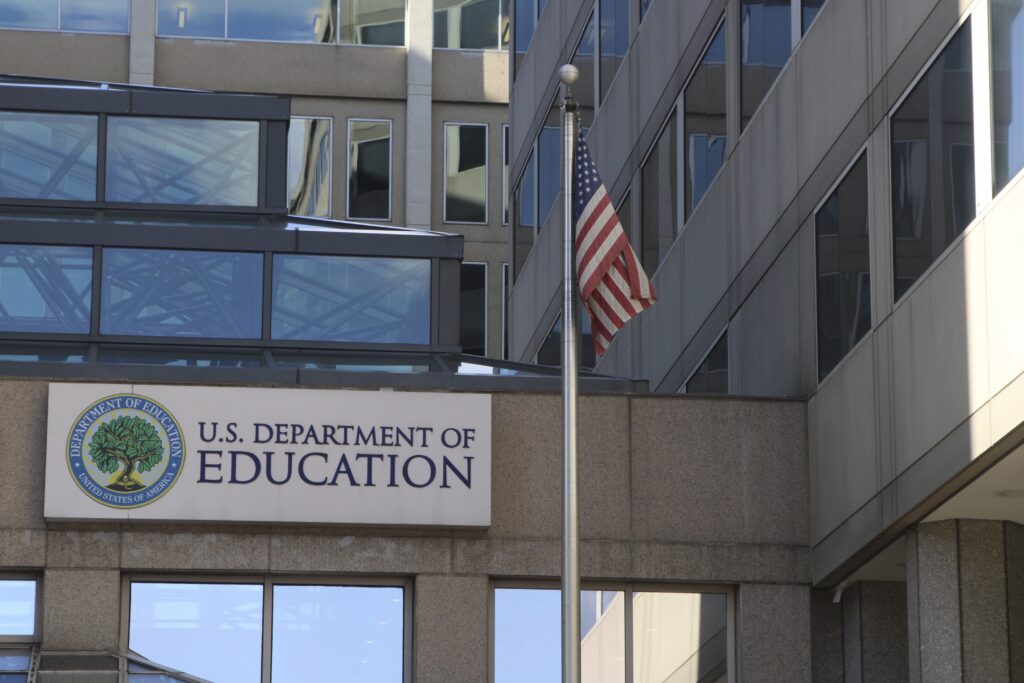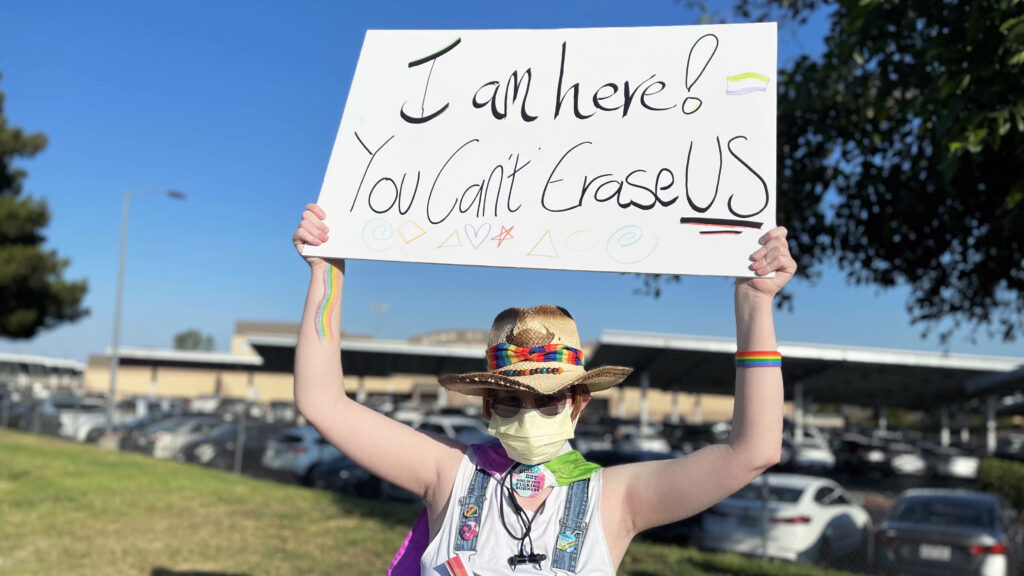
Credit: Carlos Kosienski/Sipa via AP Images
K.D. was just starting to believe that the racial harassment her daughter had experienced at school for the last three years would finally be addressed.
Students had called her daughter the N-word, referred to her as a “black monkey” in an Instagram post, made jokes about the Ku Klux Klan and played whipping sounds on their phones during a history lesson about slavery, according to a statement by her mother, identified in court records as K.D.
“My daughter reported all of these incidents to teachers and was never told whether they were addressed, if at all,” K.D. stated in her declaration.
K.D. did what many parents do when they believe a school district has violated their child’s right to an education free of discrimination: She filed a complaint with the U.S. Department of Education’s Office for Civil Rights (OCR) in May 2023.
In December, the office proposed a voluntary agreement to the school board of the district. The board requested more information.
“We were so close,” said K.D., whose daughter is identified as M.W. in court records. “The board was like, ‘Hey, we just need this one last piece.’”
While K.D. was waiting to hear back, the U.S. Department of Education announced in March that it was cutting its workforce in half. It planned to shutter and lay off staff at seven of its 12 regional branches for its Office for Civil Rights. One of those branches shuttered was in San Francisco, which handled all the cases for the state of California, including K.D.’s.
The U.S. Supreme Court on Monday sided with the Trump administration, allowing it to lay off 1,400 employees of the Department of Education, effectively putting the Office of Civil Rights in a state of limbo.
When the mass terminations were first announced, it didn’t sink in for K.D. what this meant. The attorney on her daughter’s case told K.D. that the office was still waiting to hear from the school district’s board, which was not identified in the court records. If the case wasn’t resolved, the attorney promised to flag it when it was transferred to the Seattle office along with all the other California cases, but that would mean a much longer timeline.
K.D. recalled: “Essentially, I would have to wait like six months to a year to even hear that someone’s picked up my case.”
Four months later, K.D. still hasn’t heard from anyone at the Office for Civil Rights. She told EdSource that she’s been left with “a lot of questions” but “little hope.”
‘We were already drowning’
Caseloads at the Office for Civil Rights reached a record high of 22,687 during the Biden administration, according to a 2024 report. That was an 18% increase from the previous year.
“We were already drowning,” said a San Francisco Office staffer, a member of the AFGE Local 252, impacted by the reduction in force.
Catherine Lhamon, former assistant secretary for civil rights at the U.S. Department of Education under the Biden administration, said her department was always pleading with Congress for more staff to handle the increasing caseloads.
“There is no universe in which we would have needed fewer people,” said Lhamon, who now serves as executive director of the UC Berkeley School of Law’s Edley Center on Law & Democracy.
K.D. joined a national suit filed on behalf of other parents and students who have cases pending with the Office for Civil Rights, claiming that “gutting” the workforce and closing regional offices means that caseloads are two to three times higher for remaining staff, effectively halting investigations. It was unsuccessful in securing an injunction to stop the mass terminations.
In court documents, the Department of Education reported that between March 11 and June 27, OCR received 4,833 complaints, dismissed 3,424, opened 309 for investigation, and resolved 290 with voluntary agreements.
Lhamon said that represents a fraction of the work under the Biden administration.
“What we see right now are performative case openings and very little case closings,” Lhamon said.
The U.S. First Circuit Court of Appeals halted the mass firings, scheduled to take effect in June, through a preliminary injunction. The suit, joined by California Attorney General Rob Bonta, claimed the terminations were “not supported by any actual reasoning” about how to eliminate waste, but were “part and parcel of President Trump’s and Secretary McMahon’s opposition to the Department of Education’s entire existence.”
In her successful appeal to the U.S. Supreme Court, U.S. Secretary of Education Linda McMahon denied that the terminations were related to a desire to shutter the Department of Education. Her appeal claimed the preliminary injunction represents “judicial micromanagement of its day-to-day operations.”
But McMahon also said in an interview that the firings were “the first step on the road to a total shutdown of the department.” A presidential administration eliminating an agency established by Congress poses a “grave” threat to the U.S. Constitution’s separation of powers, according to a dissent by U.S. Supreme Court Justice Sonia Sotomayor.
“When the Executive publicly announces its intent to break the law, and then executes on that promise, it is the Judiciary’s duty to check that lawlessness, not expedite it,” Sotomayor wrote.
Cases in limbo
M.W.’s case was one of 772 in California pending before the Office for Civil Rights when the San Francisco branch was shuttered, according to a site that has not been updated since President Donald Trump took office.
Advocates say the office provides a venue to address a discrimination complaint, especially for those who haven’t had success appealing to their district or state and cannot afford to hire a personal attorney.
“No one’s going to OCR if they have any other option,” said Johnathan Smith, an attorney with the National Center for Youth Law, the Oakland-based nonprofit that represented K.D. in her suit. “The reason why K.D. turned to OCR was because she didn’t have options. And so for this administration to literally pull out the rug from under families, from children who are at their lowest point of need, is beyond cruel.”
The Department of Education updated its list of recent voluntary resolutions, which include seven cases in California during Trump’s second term.
There were also two letters addressed to State Superintendent of Public Instruction Tony Thurmond and the California Interscholastic Federation, involving transgender athletes’ eligibility to participate in school sports.
The other resolutions involve agreements regarding disability cases, including those at San Diego State University, as well as the Belmont-Redwood Shores, Cupertino Union, Inglewood Unified and Tehachapi Unified school districts. Letters about the resolutions were signed by attorneys with phone numbers that contain Washington, D.C., or Seattle-based area codes.
It’s unclear whether most of the nearly 800 cases in California pending before the Office for Civil Rights when Trump took office have been addressed. The department did not respond to requests for comment.
Most deal with disability: the right to a free and appropriate public education, harassment or discipline.
The office also handles discrimination claims filed by students and parents or staff on the basis of gender, race, age, nationality or language. Over three-quarters of the pending cases in California deal with the TK-12 system — the rest are postsecondary. The office investigates discrimination claims at the state level.
“No state is immune for the need for a federal backstop against that harm,” said Lhamon. “We have had six-decade bipartisan recognition that it is true.”
‘Speaking her truth does matter’
M.W. will be a junior when she returns to school in the fall. Her mother, K.D., told EdSource that her daughter continues to be bullied by students and the issue remains unaddressed by the school district.
“The driving force for me has been just like her, knowing that what she has to say and her speaking her truth does matter,” K.D. said. “I want her to know, no matter how long this has taken — or will take — that it does matter.”
Schools are where students learn about academic subjects, but also how society functions.
“Schools are where we teach people how to participate in democracy,” Lhamon said.
She worries that if the federal system for addressing discrimination breaks down, students will receive the message that discrimination is allowed.
“If you are harmed and no one speaks up for you, what you take home is that it was OK,” Lhamon said. “That’s the worst part of the lesson.”




